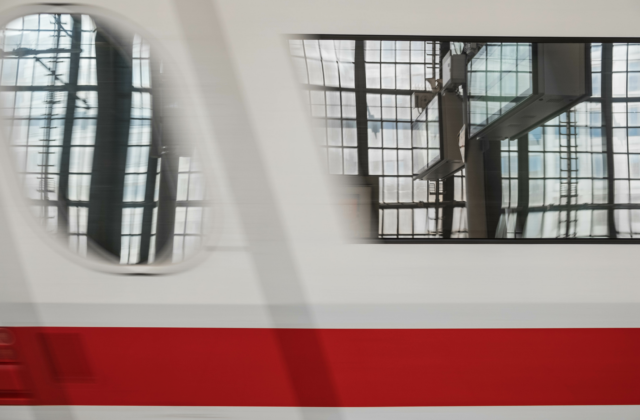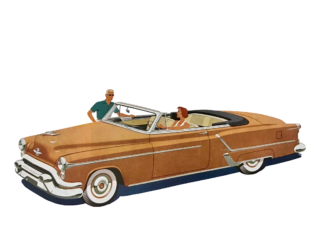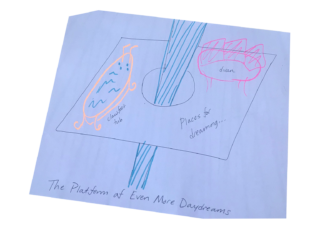
In our Modes of Transportation series, authors share notes from time spent in transit.
8:10 AM CET: The train from Marseille to Berlin. We roll out of the station facing backward, the golden statue of the Virgin Mary atop Notre-Dame de la Garde catching the acute angle of the early morning sun. We will be on this train a little over six hours, and then the next one for a little over five.
Last night we went to dinner and then went drinking in the bars around Notre-Dame-du-Mont, and neither of us was pleased about waking up early. Up the Boulevard d’Athènes at half past seven with big purple suitcase and backpacks and tote bags. Vijay took charge of the heavy suitcase. I have a straw basket I bought a few days ago, which holds ceramics and five and a half packets of Camargue rice. My back hurts from the hotel mattress. We hauled our stuff up the street as the salons de thé were just opening their shutters, and then up the grand staircase of Marseille Saint-Charles, one of the most elaborate railway station entrances I have ever seen. Art nouveau lampposts and palm trees cascade downhill, port-ward, flanked by two statues built to celebrate France’s questionable colonial legacy — to the right is a reclining naked African woman, while to the left is a reclining naked Asian woman. Mostly everything is covered in graffiti. Marseille is one of the most beautiful places I have ever been. We have been trying to figure out how we might move here for a year.
We are seated on one side of a fold-out table. A Frenchman in a checkered shirt, linen jacket, and wire rimmed glasses sits opposite. He is maybe sixty. When we sat down he was on the phone with somebody, and walked away while we stowed our bags, as though annoyed we had entered his conversational space.
Through the window, to our right, a last glimpse of the Mediterranean through the silhouettes of cranes and shipping containers down to the old fortresses, the rocks. Then a tunnel. Now we are in the sun-baked landscape of Provence, approaching Aix. Rocky hills, bright pink valerian bursting out of the limestone soil. It looks a lot like Southern California. At Aix, a woman with neat hair gets on and sits across from us beside the man in the linen jacket. She applies lip balm and hand sanitizer, and the smell drifts over. How many months now since I last used hand sanitizer? Nobody is wearing a face mask — on French trains one doesn’t need to anymore. At some point during this trip Vijay and I will catch COVID for the first time.
Two teenage boys sit further down the carriage. One takes a call, telling his mother that he’s on the train. When he gets off the phone he sighs. A boy sick to death of reassuring his mother that his body is where she expects it to be. On the fold-out table sit our Americanos. There was an incident at the station — Vijay asked for two café crèmes, and we received lattes. In Germany, a café crème, confusingly, is what you ask for when you want black coffee. In France, no. For the last three weeks, with no company other than each other, Vijay and I have begun speaking an idiosyncratic hybrid language, peppered with French and German. It would be excruciating for anybody else to listen to us. Vijay is fluent in German and studied French at university. I am taking German lessons, and maybe because I’m exercising the language acquisition part of my mind again my French, turned rusty from lack of use, has come roaring back these last weeks in France. On the fold-out table sits a new novel by Christine Angot, Le Voyage dans l’Est, which I am reading very slowly in French. Yesterday I spent half an hour puzzling out a paragraph which occurred in a car, full, as it was, of vocabulary I had never needed to learn before — la boîte a gants (glove box), le levier de vitesse (gear shift), le tableau de bord (dashboard).
It is nice to be able to look out the window. The hills on the edge of Marseille are already fading into the haze.
10:15 AM: I slept between Avignon and Lyon. The man in the linen jacket is gone. The woman with neat hair now sits beside a teenage girl with bulky, baby pink headphones. The train is much fuller. In my line of sight are two women in their twenties, one exceptionally beautiful, knitting side by side. I can’t tell what language they’re speaking, but it sounds Scandinavian, I think. Swedish or Danish. We cross either the Saone or the Rhone — how greedy for a city to have two rivers — and pass the Foundation Paul Bocuse. There are oleander bushes thronging the gardens of Lyon in pinks and reds. I try to remember why I know the name Paul Bocuse, and then it comes to me — he was a notable French chef, the kind of person who wrote the big fat cookbooks your mother and grandmother would have used. When I was sixteen I spent the Australian summer holidays, December and January, on exchange in France. That was across the country, on the Atlantic coast, in a small town called Saintes. It was the first time I’d left Australia, and the first time I’d needed to navigate snow. I’d seen snow before, on the Australian snowfields, but I’d never had to, say, slog through the snow to catch a train. I accompanied my host family to Paris, to see some sights, and then the day we were due to travel on to Brittany, the snowstorm arrived. I did not know what one was meant to wear in the snow, and so I trailed through snowy Paris in beat-up Converse high-tops which soaked my feet, and when we got to Montparnasse there were delays all over France due to the snowstorm, and hundreds of people sat, grumpy and cold, in the departure hall, waiting for their delayed trains. My feet were so cold they began to ache, and then throb, and I realize, now that I’ve lived in cold countries for a decade, that that’s a bad sign. On the train to Rennes, when it finally came, I removed my socks and shoes and sat my feet atop the radiator in the train’s floor. During that trip to Paris we went to the Galeries Lafayette, and looking for something to get my mother, and mentioning that she liked cooking, the host mother recommended Bocuse. In February I brought the heavy hardback volume of Bocuse, an English-language edition, home to Australia, but my mother never used it. It was translated into American English, she said, and therefore the measurements were in pints and ounces, American cups and American pounds. To her, it was unusable.
Vijay is sitting beside me. He is reading a Wikipedia article on the film Nadu Iravil. He was writing all the time that I was sleeping. He had been keen to get work done on the train, the train being an ideal workspace. For much of the pandemic, when we were locked down in Berlin, Vijay would take a walk up to Gesundbrunnen train station and stand on the bridge to watch the trains pass through. The regional expresses to Brandenburg. The ICEs to Frankfurt, to Cologne, to Munich. The trains to Warsaw and Prague. The lit-up windows of every carriage headless, passenger-less. The trains still ran, even when we weren’t allowed to travel further than a 15 km radius around our residence. During those months we would often plan elaborate train trips which were, at that time, impossible to undertake. We became frequent visitors of The Man in Seat Sixty-One, a website run by a former British railway worker, which provides comprehensive train travel guides all over the world. My favorite trip to plan was one going south. We might — one day! — take the train from Berlin to Vienna, then an overnight train from Vienna to Bucharest. From Bucharest then to Sofia. Stay the night. On to Thessaloniki, all the way to Athens. I wanted to go where it was warm. Vijay liked the idea of going east. From Gesundbrunnen up the street straight on to Warsaw, then the sleeper train to Kyiv. Onwards from Kyiv to Odessa, where, at the port, one could get a ferry across the Black Sea to Batumi, and then by rail to Tbilisi. Such a journey is now, obviously, even more impossible than it was two years ago.
In Europe planes are quicker, and often cheaper. But the train is nicer. One can observe things more slowly on a train. It has a more intimate relationship to the landscape it passes through—you see the plants change, see the architecture change. I have not, for instance, seen any pink valerian since I fell asleep. Train trips are conducive to reading, writing, and thinking. You can also, as Vijay points out, walk to the bar car and have a small wine.
We are not far outside of Dijon, although we won’t be stopping there. It is an early summer day of blue sky, vivid green oaks, hazel, walnut trees. Fields. Everything fecund. The vineyards have given way to fields of vegetables — lettuces, I think, and maybe onions. Sometimes the fields are full simply of bales of hay. The teenage girl is reading French Cosmopolitan, her denim jacket balled against the window to provide her with a head rest. The cover and its headlines shriek at me. Sexe: le porno vs la vrai vie.
1:15 P.M.: The line in the bar car was half an hour long. We barreled through Alsace, past villages that look suddenly Swiss, and suddenly German. We are approaching the border. We waited in front of people ordering their lunch from the bar — there are a few stools to sit on, but no compartments or spaces to linger. An elderly Frenchman ordered a goat’s cheese sandwich, and then wanted to quibble with the barman over the provenance of the train beer. It’s Belgian, the barman insisted. The Frenchman pointed out that a French address was listed on the label. He wanted French products only. The barman tried to explain that the address was that of the French distributor, not the address of the brewery itself, but the man was convinced he had outsmarted the barman, and after much back-and-forth went off happily with his goat’s cheese sandwich and Belgian beer, believing it to be French. We only wanted coffee. When we returned to our seats a man was sitting in Vijay’s place, having pushed aside our things. He apologized softly and moved. The woman with the neat hair leaned over and hissed in English that she had tried to tell him, but he wouldn’t listen. She holds her head in her hands now, the Scandinavian girls are taking fistfuls out of a loaf of olive bread, and Vijay is reading the copy of The Tree of Man I bought him as a gift when we were first courting. “Relationship homework” was what we called these gifts, back then, although they were, more properly, tokens of the heart. He bought me a volume of Kleist, I bought him a volume of Patrick White. I bought him, as well, books by Fleur Jaeggy, Annie Ernaux, Elizabeth Hardwick, Lydia Davis. He recorded me Jean Rhys short stories and John Ashbery poems, which I would listen to walking around the cold streets of wintertime Brooklyn.
At Strasbourg, the last French stop before the German border, the train waits five or ten minutes at the station. When we depart, we leave the way we came in, and so now, at least until we change trains in Karlsruhe, we are facing forward. We cross into Germany over the Rhine, a German flag and a European Union flag fluttering by some boats on the eastern side of the Pont d’Europe. An announcement in French, then German, instructs us that it is compulsory to wear face masks in Germany. Everyone, slowly, fishes one out of a bag. Vijay hands me a fresh FFP2 individually packaged inside its own shell of sanitary plastic. It smells, I tell him, like a new car, or maybe, upon reflection, it smells like the showbags we would buy as children from the Easter Show in Sydney. Our legs are getting twitchy, and the seat is beginning to feel uncomfortable. Vijay stretches his long legs out into the aisle, almost touching the toes of a long-legged German man across the way, who has just finished an Agatha Christie krimi. A father leads his toddler down the aisle, a little boy, not yet verbal, but absolutely delighted by the button-press door situated immediately behind us. He is not tall enough yet to push it himself, so his father puts his hands under his arms and lifts the boy up so that he can press with his tiny finger the big, green-haloed button. Soon, we will be changing trains.
2:45 P.M.: There’s a Pride parade this afternoon in Karlsruhe, and the station is jammed with people in outfits, trailing rainbow flags. We have an hour and twenty minutes until our next train leaves, and so we descend into the atrium and out into the street. Across the tramlines, an old stone gate leads us into the Karlsruhe Zoo and a small, still lake, beyond which we can see five bright pink flamingos. Children are lapping at ice cream cones. To the left of the zoo entrance is a beer garden, and we walk in with our things, sitting down outside. Vijay orders ein großes Helles, and I order einmal Weissburgunder, bitte. My German is most confident when I am ordering at bars. We sit in the sun. We drink. Once we’ve finished, we cross back across the tram tracks. I buy snacks and three mini bottles of Baden-Baden red wine from a store. When the train arrives, five minutes late, we find our seats and discover that we are, once again, going backward. Across the aisle, a woman sits at a table with a thick annotated volume open in front of her. Vijay thinks she is translating poetry.
I read fifty pages of Compass by Mathias Énard (in its English translation) and fall asleep again. When I wake up, we are stalled just outside of Frankurt am Main Sud. The overhead screen says we are now running thirty-nine minutes late. An intercom announcement mentions a delay, and Vijay, translating, tells me a goods train has broken down directly in front of us, and so we are waiting for it to be fixed. The bar car is closed because they’ve run out of supplies. When the train starts moving again and finally arrives at Frankfurt Sud several people race down the platform past our window, trying to get to the connecting train that will take them to the airport. The sun shines in at a hard angle. I play with my hair. Vijay points out a mysterious purple stain on my white T-shirt, over my left breast. Neither of us knows how it got there. The girl translating poetry is still translating. She is very thin with long brown hair and makes quiet study look like an infinitely appealing pastime. She reminds me of a girl I knew in university of whom I was very envious. A young man has come to sit in front of us, and through the divide between the chairs I can see him slumped over, half watching his laptop screen, half watching the girl.
Stopped at Hanau, a woman on the intercom asks that if anybody on board is a doctor, please make themselves immediately known.
I decide it is a good time to open one of the small bottles of wine. We pass through pine forests and over their pointed heads there is occasionally the sight of wind turbines rotating on the horizon.
5:30 P.M.: It is a luxury, an adult luxury, traveling like this. With little bottles of wine and a lover to carry the heavy suitcase. It is impossible for me to be on trains in Europe and not remember the endless trains that defined the year that I was eighteen. In 2008, the year after I finished high school, I spent six months traveling alone around Europe on trains. I had saved six thousand Australian dollars working a minimum wage retail job, and my parents had gifted me the plane tickets as an eighteenth birthday present. Shortly after I left Sydney the global economy collapsed, the Australian dollar plunged in value, and suddenly I did not have very much money at all. I assigned myself sixty Australian dollars a day, inclusive of accommodation and transport. It meant that I never had much left over, maybe the price of museum entry, and mostly just walked around. By the end of the trip I was living off oranges and milk chocolate and was not terribly well. I persisted in traveling, nearly always by train, and it was on the trains that I felt safest, cleanest, the most calm. In hindsight I’m not sure what the purpose of all those months was. I went to a lot of cities, and learned to fend for myself in many languages, but I was frequently lonely, and didn’t go to a single bar, no clubs or gigs, kissed no one, and left my virginity intact. I was often, I think, rehearsing which version of myself I would like to be. Would I like to be an artist? A writer? A diplomat? A journalist? Would I like to live in Paris, in Budapest, in Copenhagen? Most of my memories are of reading specific books in specific places. Finishing The Golden Notebook in an Exeter youth hostel. Rereading Anna Karenina in a field outside Salzburg. Shoplifting A Hero of Our Time in Paris when a Spanish-speaking man persistently tried to ask me out, and in a panic, I fled Shakespeare and Company without paying. I read books and listened to the music on my iPod and felt my enormous feelings. I didn’t want to go home, but I had no idea how to stay. When I had to leave, I deliberately booked a flight that left London the day before my birthday and landed in Sydney the day after. One of the most melodramatic gestures of my life, I time-zoned away my nineteenth birthday.
A woman on the intercom asks that if we are in possession of any magnesium that we please come immediately to wagon nine. A few moments later two aging German punks with gauges in their earlobes stride past our seats in the direction of wagon nine, holding half-consumed blister packets of pills in their hands. Now, apparently, we are running fifty minutes late.
8:30 PM: The sun shines right through our window as we barrel east, backwards. The young man in the seat in front has been giggling at whatever he’s watching on his laptop. I have read a further hundred pages of Mathias Énard. We are traveling at 160 km/h, and we have just passed Wolfsburg. Somewhere near here, we will pass over the former border between West and East Germany. This is the Green Belt, the death strip turned haven of biodiversity, of otters and rare orchids. There are wolves here too. A few months ago Vijay translated something about the thriving wolf population in Germany. There’s a website where you can track their numbers. I check, and I can see we are right in the middle of wolf country, their numbers thick and fast from the former borderland all the way to Brandenburg, where they circle Berlin like a slowly invading army.
The sun is a bright red-orange ball descending through the fir trees, and there is a glow on the horizon now which sets the silhouettes of the pines into a black oneness. We are barreling through the interminable flatlands of Brandenburg towards Spandau. In the dusk-fields I see lone men sitting in parked cars, grazing cows, a solitary deer watching the train go by. We are sharing, now, the third small bottle of wine. The scholar has closed her laptop, although not the big, annotated volume of possible poetry, and she is reading her WhatsApp messages. The boy in front of us who was half-watching her has sprayed himself down with cologne and breath-freshener, and now the cloying smell of the aerosols drifts through the train. You can’t open the windows in this carriage, which, now that I notice it, feels unsettling. It is 9:25, the time we were meant to arrive at Berlin Hauptbahnhof, but we have a half hour until we will reach our destination. And longer, to get the M10 and then the U8 home.
People are beginning to collect their things. I can see the boy in front of us reflected in the glass of the window. He is slumped over the table, his hands clasped together, his head lowered, but not quite touching, the surface of the table.


